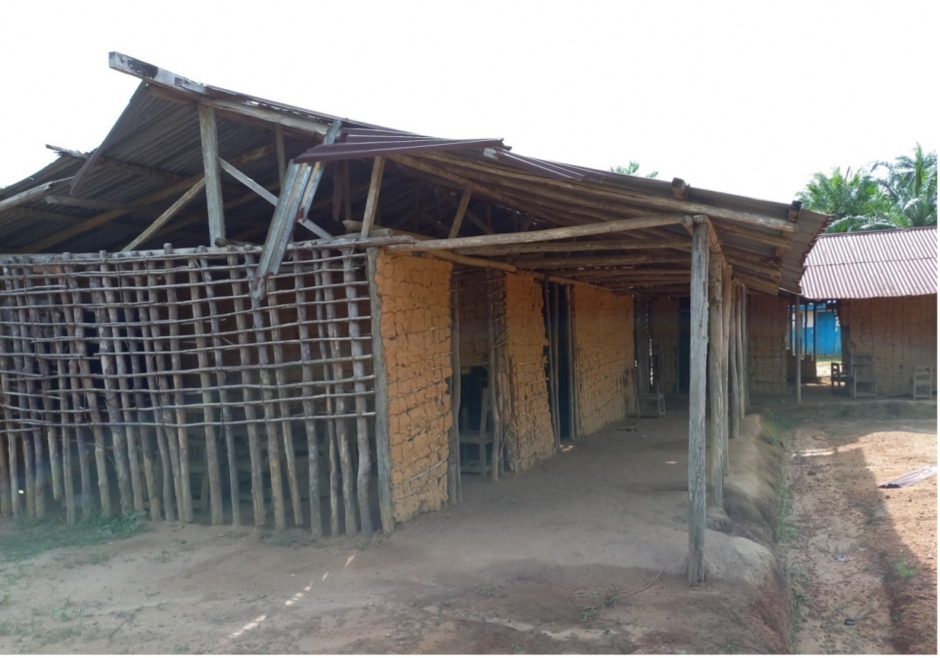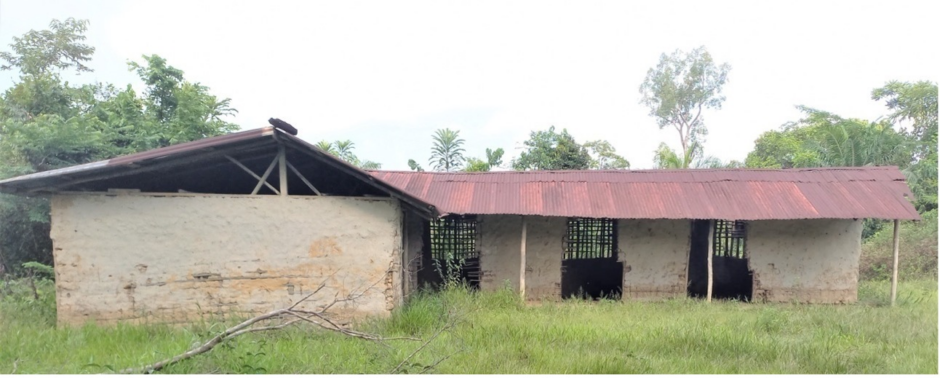This two-part series examines the county’s school system.

MONWEH, River Cess- Jacob Beegar sits on a rattan chair under a palaver hut while his friends run around. Jacob doesn’t join them. The 15-year-old doesn’t want to play. He would rather be in school.
Jacob should be in the 4th grade at the nearby Giemengbleh Public School in Kporkon Monweh District. But the school has been closed since 2020.
Instead, Jacob accompanies his uncle John Beegar every morning to help with farm work. Jacob is the last of four children. Uncle John took him in when his parents could not afford to keep him in school. Jacob fears his own future will be not better than his parents’.
“My ma and pa poor, that why I want to go to school to help them,” says Jacob. “But the way I not going to school again, that mean I will be poor like them.”
The school shut in 2020 when the last teacher finally left. Even before the school closed it was doing a poor job of teaching kids in this village.
“The school had just one teacher teaching more than one hundred and forty some more children,” according to Jacob’s uncle John. “But the man was not getting pay from the government so he closed the school and left.”
The school building – made of sticks with mud walls – has begun to collapse. It sits now, a roofless ruin, on the edge of the village – a symbol of the crumbling dreams of children and parents here.
The closest school is in Boegeezay, an hour away by motorbike. Jacob’s uncle does not have the $LD1000 it costs each day to send his nephew there. Neither do other families here. Jetta Wee, 10, and Blessing Duo, 11, are among other kids sitting under the palaver hut instead of going to school. Other children moved to stay with relatives in Boegeezay or the city of Buchanan.
Many schools in River Cess are closing because of teacher shortages. Parents and teachers blame poor management by the Ministry for Education. Potential teachers find it impossible to get on the payroll. When teachers leave they continue to get salaries. And the ministry does not replace teachers when they leave.

Records from the office of the County Education Officer show that there are 115 public schools in five education districts in River Cess county. 400 government teachers are assigned in the county. But teachers and parents say the true number of teachers in classrooms is likely far less.
FrontPage Africa and New Narratives first did an investigation of River Cess schools a decade ago finding as many as 45 students crammed into classrooms with no roof and chairs. Funding was a major problem then, with just $US40m allocated to the entire country’s education system including universities. Ten years on, the budget for education has more than doubled to $US87m but still many students are missing out.
Experts say the problem is playing out across rural areas of the country with dire consequences for Liberia’s future. Educating children is vital to Liberia’s development but a 2018 Unicef report found that 16% of primary aged children were out of school, one of the highest rates in the world. “An inclusive education for all” is number 4 of the UN’s 16 Sustainable Development Goals.
Teacher shortages plague River Cess. A story by this reporter on ELBC Super Morning Show in December found that 50 teachers had left River Cess classrooms and were still being paid. Shortly after that story broke, Peter Knowlden, River Cess County Education Officer, wrote to the Director of Human Resources at the Ministry of Education to put “a hold” on the salaries of 50 teachers he claimed had abandoned the classroom but were still receiving salaries.
Knowlden, in an interview, said he convened a meeting in Cestos in October 2021 where some of these teachers were in attendance. According to him, he told them to “come home to return to the classrooms or be deleted from the payroll.”
“Some of those guys had been out of the classroom for more than 10 years,” Knowlden said. “If they do not come back, we will not delete them but the law will delete them.”
But in fact, documents obtained by FPA/New Narratives show that the majority of the teachers left their roles with the approval of the heads of the school districts.
Teachers say they were given permission to leave
Eight of the teachers being accused of abandoning their duties were interviewed by FPA/New Narratives but almost every one of them claimed that they were granted permission to leave.
In an interview, Peter Wilson, then District Education Officer, confirmed he had granted the leave but alleged that the teachers reneged on their agreements.
“They went to study to come back but they have overstayed and that was not the agreement,” Wilson says. “They schools are empty and they are in Buchanan doing nothing. That’s we took the decision to let the ministry know.”
But that is not the case according to letters seen by FPA/New Narratives. Teacher John Toby, for instance, was granted permission to take leave in December 2020 and resigned a year later. Wilson received the resignation 21 days before the CEO filed the complaint to the Ministry of Education. Toby now works in the office of Wellington Geevon Smith, a senator of River Cess.
Several schools are shut down here due to lack of teachers while others are being run by a single teacher. One such is school is Gbouzohn Public school in Kploh which was closed from 2019 to 2021. Jerome Toe, the only teacher assigned here was deleted from the payroll in 2018. After failing to get his name back on the government’s payroll, he closed the school and left the town.
Parents persuaded him to reopen the school in November 2021. Although many of the students have dropped out or moved to gold mines for work, Toe says the current enrollment is about 150.
“My name was deleted from the Government of Liberia Payroll since 2018, when the IAA [Internal Audit Agency] came and I was not present during the time of the audit due to my illness,” Toe says. “When I was away the community usually cry because for the past two years children were not learning things were really down. So I decided to come and the reception is still poor. Even if I charge them $LD500 for students to register it is still coming slow, that making I alone to be in the classroom.”

When there are teachers, they are often absent. Vondeh Public School has 163 students, but when FPA/New Narratives visited in June, the school had been shut because its two teachers left for a training workshop in Cestos.
“The teachers told us that they were going for their salaries on the road to come back,“ Garpue said Edwin Garpue, Chairperson of the Parents Teachers Association (PTA). “But I’m surprised to hear that they are attending training in Cestos. So like that, there will be no school here for the next two weeks or so.”

Other schools that are shut down in River Cess as a result of teacher shortage, coupled with other challenges are in Gorzohn, Dorbor, Sawpue and Gbardiah.
Following media reports and a public outcry the Minister of Education, Ansu Sonii, announced an investigation in the county. The result of the probe saw all DEOs and the Human Resource Officer in the offices of the CEO – Peter Wilson, Isaac Innis, David Jarwoe and Cheyee Kpanwon – suspended for one month without pay.
Their suspension letters dated May 2, 2022 were under the signature of James Armah Massaquoi, Acting Deputy Minister for Administration at the Ministry of Education.
According to County Education Officer Knowlden, the suspensions were triggered by the discovery of 50 teachers who reportedly abandoned the classrooms but were still receiving salaries. 27 teachers were retired in June 2021 by the Ministry and not replaced.
Upon hearing that the DEOs were suspended, many residents and civil society actors in River Cess hailed the Minister. But Simon Outland, the head of the River Cess’ Branch of the Civil Society Council of Liberia, is one of many critics who say in order to really improve the River Cess School System the Ministry should go further.
“One month is not sufficient,” says Outland. “It should be one year or six months without pay.”
George Trokon, a retired teacher and former president of the River Cess’ CSOs says, because the government has not been punishing corrupt education officers, they continue to spoil the county’s school system.
“One month suspension is not sufficient. The schools have no teachers as we speak,” says Trokon.“The ministry should always be prepared to replace people and they are not doing it. You come you see so, so, C certificate holders teaching all the subjects.”
The CEO insists the investigation will continue.
“Those findings, media reports and every other concern being raised by our people are being looked into,” says Knowlden. “No matter where you are, if you are found liable for anything, you will be punished. But we have to work in line with the policy.”
This story was a collaboration with New Narratives as part of its ‘Investigating Liberia” series. Funding was provided by the Swedish Embassy in Liberia. The funder had no say in the story’s content.
